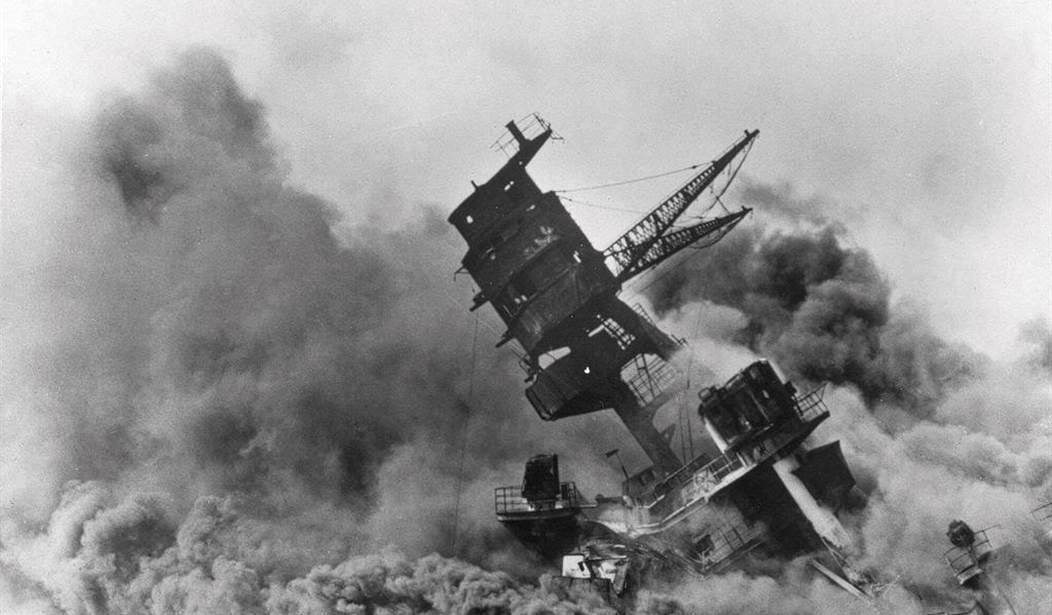It truly was a day that was to live in infamy. 82 years ago today, the Empire of Japan launched a surprise attack on the United State's Navy and Army installations in Hawaii, particularly the Pacific Fleet in Pearl Harbor.
The next day, President Roosevelt spoke to Congress and the nation.
The history that followed is well-known, but growing up as the child of Greatest Generation parents, I remember very well their "where I was when it happened" stories. Here are a few of those stories.
My great-uncle was in the Army when it happened, at Hickam Field in Hawaii. Jolted out of his cot by explosions and air-raid sirens, he seized a Springfield rifle and ran out to engage the Japanese aircraft with the bolt-action rifle, perhaps a futile act of defiance but one that was repeated all over Hawaii on that day.
My father was 18. He later recalled walking on the street in Cedar Rapids, Iowa, with his mother on that fateful day, when people ran onto the street from stores, restaurants, and cafes shouting the news. Dad's older brother was with his family on their farm and didn't find out about the attack until the next day.
My mother was on the living room floor of her family's northern Lynn County, Iowa farmhouse reading a book while her father sat in his favorite chair listening to the Sunday symphony when the program broke to bring the news of the attack. My grandfather no doubt wondered about what would happen to his two sons, both of the age to serve.
My paternal grandfather was in his home, likewise listening to the radio, which broke the news. He told me once, many years later, that all he could think of was his Army service during WW1, how he was lucky enough to not have gone to France, and how his two sons were also both of military age.
A neighbor from my youth, a WW1 veteran known to the community only as "Brownie," also hearing the news on the radio, remembered the trenches of 1918, and hoped fervently that it wouldn't happen again.
That's where they were. This is what happened to them:
My great-uncle showed up back in Iowa a few months after the attack, discharged from the Army for reasons he would never discuss. He disappeared again shortly after that and returned in 1946 with a new name, having gone from "Guy Clark" to "Alan B. Ladd" (no, not that Alan Ladd) and several nasty scars. He would never discuss where he had been or what he had done during the war.
Dad enlisted in 1943. He was selected for the Army Air Corps, went through officer training, and then trained as a bomber navigator. Having finished first in his class in Navigation School, the Army in its infinite wisdom sent him to radio navigation school, then to radar school, then to aerial rocketry school, then finally to Victorville, California to check out in B-29s, where he was still at war's end. His brother likewise enlisted, volunteered for the parachute infantry, and was assigned to the 101st Airborne. He jumped into the Netherlands in Market Garden, was at Bastogne, and caught an 88mm shell fragment in Germany in 1945. He came away with a metal plate in his head and a glass eye and was never the same, although he managed his farm for the rest of his life, dying finally in 1997.
Mom went on to finish high school, graduating in 1943, one of a class of 12, eight boys and four girls. One year later, four of the eight boys were dead. Mom took a job at the Western Union switchboard, where she was often tasked with calling farm families she had known all her life and informing them they had a telegram from the War Department; those telegrams were seldom good news. Both of her brothers enlisted; the older as a Marine, landing on Pelelieu and Iwo Jima, taking a Japanese bayonet through the shoulder on that last action and almost dying of sepsis; as long as he lived, he would never discuss the war. His younger brother served as a radio operator and gunner in a B-26 bomber in Italy and came through without a scratch — physically.
Brownie and his wife, Grace, watched their only son, Junior, go off to enlist. Junior was killed in France in 1944. I remember Brownie as a kindly old man who chain-smoked Pall Malls, who almost always had a candy bar in his bib overalls pocket when he knew I was coming to visit, and who would drive me into Readlyn for a bottle of pop whenever I asked. Mom said Brownie once told her I reminded him of Junior, which is why he catered so much to my pre-school self.
A little less than four years after the Pearl Harbor attack, this happened:
It was over.
Thus began the story that would result in the Greatest Generation earning that name. Few of them are left, now; the last in my family to go were my parents. Dad passed in 2018 at 94 years of age, and Mom in 2019, at 90. But their stories stay with us, as is only just.
This is a good day to remember them, as well as the veterans of all wars since; on days like this I think back on my service, as well as my wife's, both of us serving as we did in the Army and deployed to Operation Desert Storm. It's a good day to reflect, to remember, and to think hard on the caution left to us by George Santayana: Only the dead have seen the end of war.














